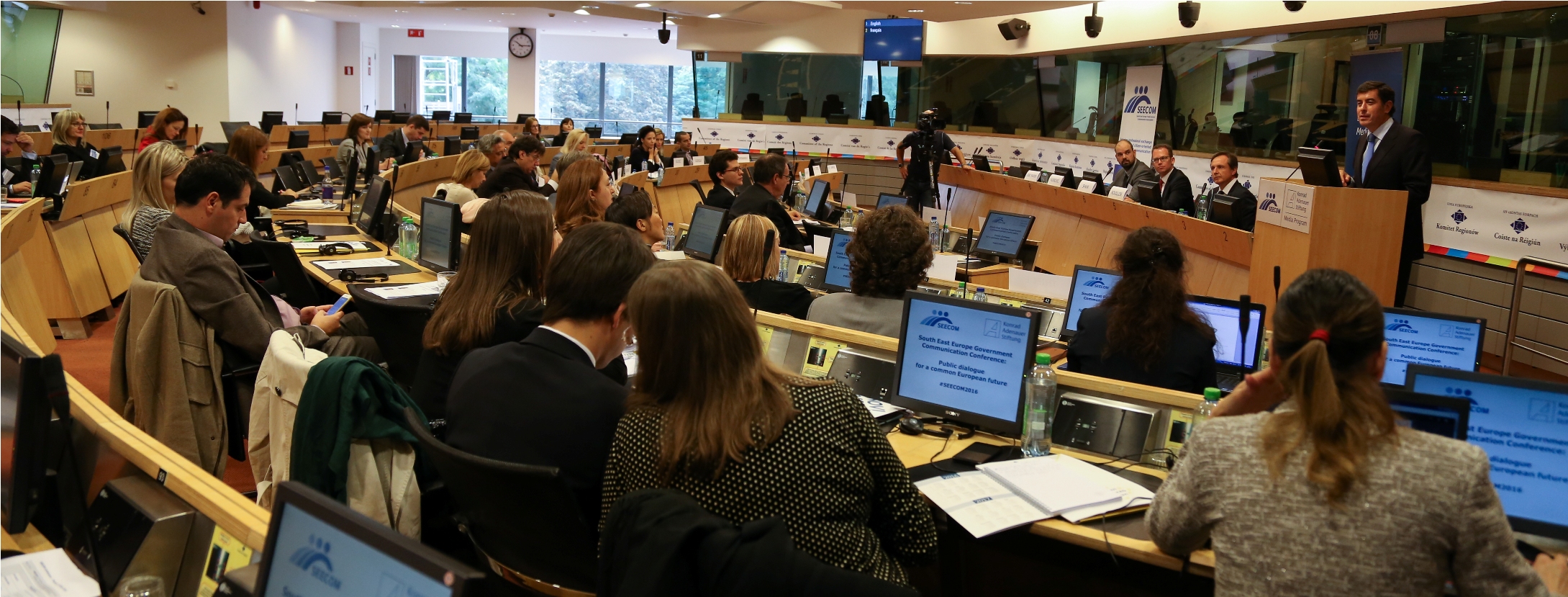Brussels, 7 October 2016 – Senior public communicators from South East Europe met with their peers from across Europe, EU officials and civil society activists at the 4th SEECOM conference “Public Dialogue for a Common European Future”, taking place in Brussels on 6-7 October 2016.
The conference debated public communication perspectives and dialogue-driven solutions to a number of pressing, transnational and national, social and economic issues affecting the region of South East Europe and Europe as a whole.
The event was organised by SEECOM, South East Europe’s public communication association and the Konrad-Adenauer-Stiftung Media Program South East Europe, in cooperation the European Economic and Social Committee and the Committee of the Regions, and backed by the National Democratic Institute. Following the conference, the SEECOM members’ assembly re-elected Ognian Zlatev as Chairman and Vuk Vujnović as Secretary General of the association.
The Conference reached the following conclusions:
Europe between feeding populism and projecting values
At times of challenge, communication outreach and dialogue with citizens are of utmost importance for a stronger support to the European perspective for citizens of South East Europe.
In EU accession countries, communication should be based on shared underlying European values and a transformative effect of the accession process.
Public institutions suffer from lack of credibility and need to look for new avenues to offer counter narratives to populism as a serious threat for Europe’s integrity and cohesion.
However, populism ‘as the voice of the unheard’ can also be an important source of reflection for learning about public criticisms of Europe.
Generally, effective pro-European communications require more involvement and coordination among main partners, governments, civil society, plus an overarching narrative and one voice from EU institutions and EU member states.
National, regional and local stakeholders’ active involvement and their ownership of the communication process are absolutely critical for the success of any European communications initiative and work in synergy remains crucial.
Migration crisis – putting a human face to policy
Instead of succumbing to the populist psychology of fear and the mentality that perceives any international interaction as a threat rather than an opportunity, communications about Europe, as a project based on values, should appeal more to common values and use the language of ‘unfear’. This can instil confidence in Europe as a strong, globally relevant, peaceful and prosperous community.
In parallel, populism should not be feared but acknowledged as a very precise indication of citizens’ biggest concerns and communications about Europe must show care for those concerns.
When communicating with citizens, it is essential that a clear distinction be made between migrants and refugees, as the two terms have distinct and different meanings, and confusing them leads to problems for both groups. Migrants are usually driven by economic factors, or they want to be close to family members, whereas refugees are forced to relocate for reasons such as fear of persecution due to war, religion or political opinion.
In addressing major economic, social and political turmoil such as the refugee and migration crisis, communications should go beyond political messaging; they should become a part of policy efforts to provide better public services to those affected by the crisis.
There is a lot more room for cooperation with civil society and those who work with refugees on the ground, than it is currently the case. Europe’s challenge to manage around 1 million refugees and migrants needs to be put into a wider perspective, as there are currently more than 65 million refugees worldwide, vast majority of whom located in developing countries.
Unlocking the economic and social value of culture
Culture is a huge asset for the economic and social development of the region, and a badly missing link in the European communication. Speaking about European culture is even more important in the current times of crisis, because Europe’s biggest crisis is that of values and not of the economy.
EU accession countries can use culture as a major asset for their EU integration efforts, since culture is intrinsically communicative and has the power of speaking convincingly about their shared identities and values as Europeans.
Considering low use of the existing cultural funding instruments by EU accession countries, there would be considerable benefits from introducing a special instrument for the Western Balkans, modelled on the EU-Eastern Partnership Culture and Creativity Programme. Such instrument would be fully compatible with the EU’s Global Strategy on Foreign and Security Policy.

